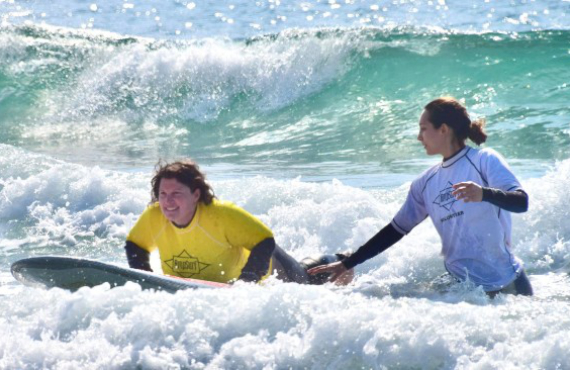Therapeutic recreation, also known as recreational therapy, uses specific treatments to meet an individual’s unique physical, emotional, social, and cognitive needs. Following the guidelines set by the National Council for Therapeutic Recreation (NCTRC), you will learn how to assist individuals with disabilities, injuries, or illness pursue active, healthy, and independent lifestyles. From physical movement activities to interventions such as aquatics, cooking, adaptive sport, and horseback riding, recreational therapists use their clinical skills and creativity to rebuild strength and functionality and increase overall quality of life.
The mission of the Bachelor of Science in Therapeutic Recreation at Regis is to prepare students in therapeutic recreation with the knowledge and skills necessary to assess the individual, develop appropriate activity-based interventions and adaptations, and provide inclusive recreation services. Graduates of the BS in Therapeutic Recreation will be prepared to serve and lead within their field of expertise, assisting individuals in pursuing leisure and recreational activities to improve personal health and well-being.
Learning Outcomes
At the completion of the therapeutic recreation program, students will:
- Master concepts regarding:
- The foundation, philosophy, theories, and practice of recreational therapy
- Human anatomy, human development and behavior, and motor learning
- Disabling conditions, impairments, and medical terminology
- The APIE (Assessment, Planning, Implementation, Evaluation) process and the techniques necessary to document and achieve specific client outcomes.
- Management, promotion, budgeting, and safety precautions in the delivery of therapeutic recreation services
- Demonstrate proficiency in reading, evaluating, and utilizing information from current research and literature in health science and therapeutic recreation.
- Apply various interventions and facilitation techniques, in accordance with the ATRA standards of practice and ethics, to provide services within a variety of settings, and for diverse populations.
- Employ critical thinking skills enabling the integration of appropriate patient data to the APIE process to achieve specific health and wellness outcomes.
- Demonstrate and promote the values and ethical standards of therapeutic recreation, advocate for the profession, pursue continuing professional development, and collaborate with other health care professionals in the delivery of therapeutic recreation services.
Careers for Therapeutic Recreation Majors
Graduates of a therapeutic recreation (TR) degree work in settings that serve people with physical, emotional, psychiatric, chronic illness, and developmental disabilities such as hospitals, senior living facilities, correctional facilities, schools, and community centers. By completing this program, students will meet all of the educational requirements of the National Council for Therapeutic Recreation Certification (NCTRC) and may take the national exam to attain credentials as a Certified Therapeutic Recreation Specialist (CTRS).
An undergraduate degree in therapeutic recreation also provides a stepping stone for numerous graduate programs including MS in TR, occupational therapy, applied behavioral analysis, or special education.
Internships for Therapeutic Recreation Majors
All students in the BS in Therapeutic Recreation program must complete a 100-hour practicum and a 560-hour internship, under the supervision of a CTRS. Students can apply to intern at any facility/program of choice. It is recommended that you review options with the Therapeutic Recreation Program Director before applying. Recent TR internship sites include:
Therapeutic Recreation Program Director Alicia Pola is an assistant professor in the Department of Health and Fitness Studies at Regis College.


